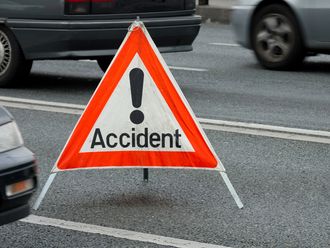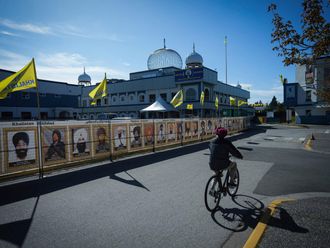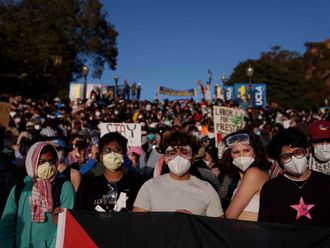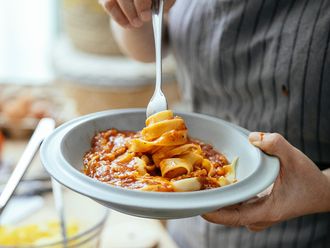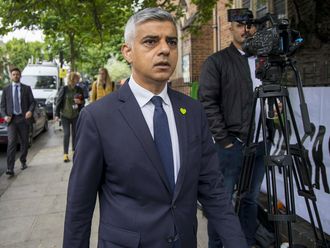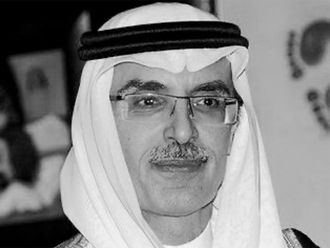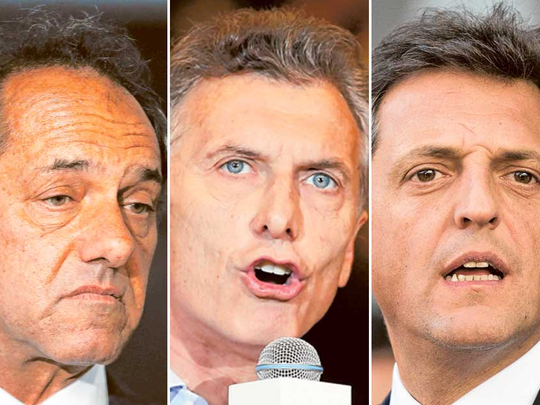
BUENOS AIRES: Argentine voters will usher in a new era Sunday after eight years under President Cristina Kirchner, but the candidates vying to succeed her look and sound a lot alike.
All three leading contenders are men from affluent families with Italian roots, and “the differences between them aren’t that clear,” says political analyst Mariel Fornoni.
Still, there are some salient differences — especially when it comes to the past 12 years under Kirchner and her late husband Nestor, a legacy revered by the president’s working-class base and reviled by the business world.
Here is a cheat-sheet on the differences — and similarities — between the candidates seeking to become the next president of Latin America’s third-largest economy.
Scioli, the one-armed frontrunner
Daniel Scioli, Kirchner’s choice to succeed her, leads in the latest polls with nearly 40 per cent in the polls.
The governor of Buenos Aires province, he previously served as vice president under Kirchner’s predecessor and late husband Nestor (2003-2007).
Known for his love of speed and sport, he lost his right arm in a power-boating accident in 1989.
But his campaign style is less high octane.
A man of few words and limited charisma, he delivers his campaign ads in a flat monotone, “I’ve dreamed of this moment all my life,” he once said.
He has repeatedly emphasized his commitment to continuity — fending off left-wing critics in the Kirchner camp who criticize him as too far to the right.
Scioli, 58, grew up in a well-to-do family that owned a chain of appliance stores.
He was an eight-time world power-boating champion until a horrific accident ended his career and set him on the path of politics.
He now wears a prosthetic arm and has downplayed his injury by doing things like knotting his tie one-handed on national TV.
He has proven himself a survivor with a slow but steady political rise in which he weathered sometimes brutal infighting among the “peronists,” the powerful political movement of former president Juan Domingo Peron.
He was elected to Congress in 1997 and became minister of sport and tourism in 2002, before Nestor Kirchner tapped him for the vice presidency.
He married, divorced and remarried former model and fashion entrepreneur Karina Rabolini, and has a daughter from another relationship with whom he has renewed ties after initially refusing to recognize paternity.
Macri, the business favourite
Mauricio Macri, the top choice of Argentines fed up with the Kirchners’ hands-on economic policy, is running in second place with about 25 per cent.
He rose to fame as the president of Argentina’s most popular football club, Boca Juniors, who won a string of titles under his reign.
The mayor of Buenos Aires since 2007, he spearheads a movement called Let’s Change that wants to roll back 12 years of policies that Kirchner says helped the working class and business leaders say are wrecking economic growth.
But Macri, the son of a business magnate, has had to tread carefully in a country with a loaded history of class conflict.
The graying 56-year-old has put on a broad smile beneath his piercing blue eyes as he criss-crosses the country’s poorest provinces, hugging children and grandmothers and promising not to take away anyone’s social benefits but rather give them the chance to work.
Twice divorced, he is now married to model and fashion entrepreneur Juliana Awada — a friend of Scioli’s wife — with whom he has a three-year-old daughter.
Massa, the Kirchner dissident
Sergio Massa, a Kirchner ally who fell out with the president in 2013, trails in third place with around 20 per cent of voter intentions.
A 43-year-old Congressman, he hails from the right wing of peronism, but failed to consolidate the vote for change as effectively as Macri.
He was a protege of Nestor Kirchner, and Cristina Kirchner named him cabinet chief in 2008 - the youngest in Argentine history.
But he left after a year and founded a rival party, the Renewal Front, in 2013.
The also-rans
The ballot also includes leftist Margarita Stolbizer, Trotskyist candidate Nicolas del Cano and former president Adolfo Rodriguez Saa, who led Argentina for seven days at the height of a devastating economic crisis in 2001.


